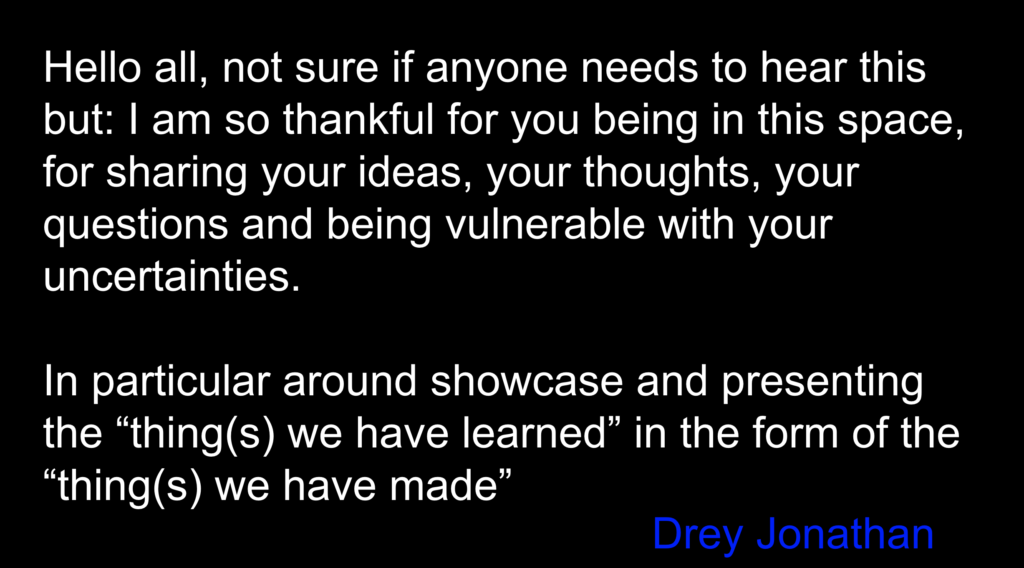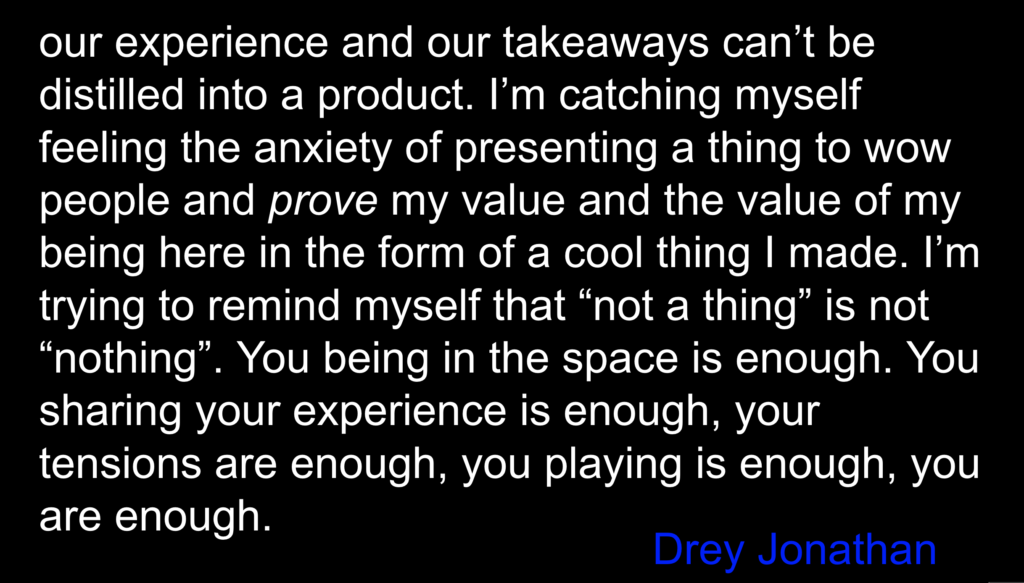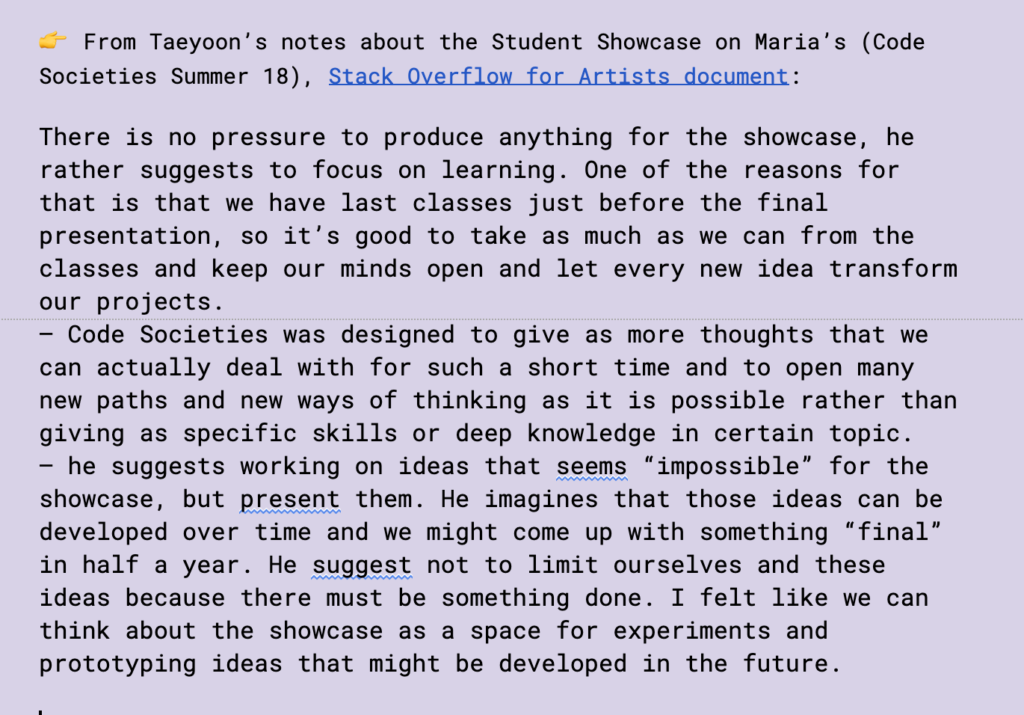
Agenda & Links
- Overview of the DLL Final Project* and zine showcase
- Would you like to design the cover of the DLL Zine? Let me know!
- Homework share – Website as gift
- More website examples
- Using Sheets as a database
- Ways of inviting Form
- Resource
- Capacities & Inspirations activity
- Markov Chain website code. Press “Remix” to make your own version
=====
💛💛💛 In Class Project 💛💛💛
Today we will connect python + web programming by making websites that have a backend of python. We will publish our websites on Glitch. We will create pages that are markov chains of our own text sources.
Python code to pull inspiration from for your projects!
Python Bag of tricks: https://drive.google.com/file/d/1A1kqfrPhK9xRhsNpMOBnQOHxl0-NBv0t/view?usp=sharing
Python Codes Words Spells: https://drive.google.com/file/d/1JDpDIm54TYMzbrUW1eKLzCSCIjMoaTBE/view?usp=sharing
Supplemental: Python Generated Poetry Website Templates
- Glitch with Python text Input example, thanks Max!
- This sketch is a boilerplate for taking in a string of text, manipulating that text in Python on the backend, before returning it to the frontend to be displayed
- Markov Chain generating website Glitch Template
- This sketch is a boilerplate for generating markov text in a website
More Python Resources
- Natural Language Processing with SpaCy, notebook by Allison Parrish
- This notebook covers, parts of speech, proper noun extraction, lemmatizing words, word counts, and more!
- Python & Tracery, Notebook by Allison Parrish
- “A Tracery grammar is a series of rules that tell the computer how to put text together, piece by piece. Tracery grammars consist of a series of rules and expansions.” – Allison Parrish
- Web Scraping with Python, tutorials by Sam Lavigne
- Note, this tutorial runs Python in the terminal, not Jupyter, dm the stewards with questions if you have ’em!
====
Final Project*: A Digital Love Language
Create a digital love language using one or more of the mediums we explored over the last 10 weeks.
- Bash/folder poetry
- HTML/CSS/JS
- Python natural language processing
- In two weeks we will have a celebration of having shared ten weeks together, a goodbye <3
- An experience to share and express what digital love languages means to you and what it could mean to others. an expression of love languages shared digitally in and of itself.
- A collective gift to those who are curious about what digital love languages are.
Note: Our class showcase will be a printed zine that I will publish coordinate and organize after the 10 weeks ends.
Here is a message sent in slack from a student, Drey Jonathan, to fellow students durning Code Societies 2020


Notes on what to share
- Each person will have 5minutes to share something. This can include sharing your screen (slides! desktop cinema! photos! raw code!) or it can just be you speaking
- What you share can be something you already made (like a folder poem!) OR something else such as your reflections on what digital love languages means to you now
- Examples of things you could show / talk about:
- reflections on what digital love languages means to you now
- moments from the class that stood out to you, either in class or even conversations you’ve had about the class outside of the class itself
- notes on liberatory learning environments
- folder poem
- a gift you made for someone with code
- a hand coded website
- Learning / unlearning
- Anti-racist computation
- markov chain poetry, lyrics, weather reports, etc.
- a final project
- It can be a group project or an individual project
- Start thinking/working on it now but know that all levels of ✨polish✨ are ok.
- again, what you share can be a discrete project or it can be a thoughtful reflection of your experiences of Digital Love Languages and your changing relationship to technology.
- It can be an physical or digital thing you document, an object, a poem, a computer generated poem, a zine, a performance, an activity, a score
Here is a message Taeyoon shared with Code Societies students as they prepared for the showcase. Note the idea to share what is impossible.

Homework for next week ☼☽
☼ Begin planning and working in what your final* project will be. There will be an opportunity for feedback in class next week.
☼ Our showcase will be a zine! Perhaps plan your final* project while keeping in mind how it will fit into a printed zine format.
Check out the DLL showcase livestreamed event from 2020:
More DLL projects here:
- https://www.are.na/digital-love-languages/digital-love-languages-projects-ephemera
- https://www.are.na/digital-love-languages/digital-love-languages-examples
And from HTTPoetics here!:
Optional
☼ For a unidirectional (safe) Consensual Hacking, which we will do next week, prepare files or scripts that can be navigated and run in the terminal. Your classmates will discover these inside a communal server next week.
Suggested reading:
Building Consentful Tech by Una Lee and Dann Toliver
Consensual Hacking can be a vulnerable space of cooperation and trust. Consensual Hacking is a guided activity where people carefully and consensually enter one another’s personal computers remotely. What is social and digital consent and how are they interwoven? What does it mean to responsibly give and take access and control to our most intimate digital spaces? Is there pleasure to be found in a bounded exchange of trust and vulnerability? In this workshop, we will learn about secure networking and navigating the terminal. Part of this is about creatively thinking through what our boundaries and desires are by designing and signing sociotechnical contracts; a social and digital protocol towards a loving, secure, & mutual transgression.